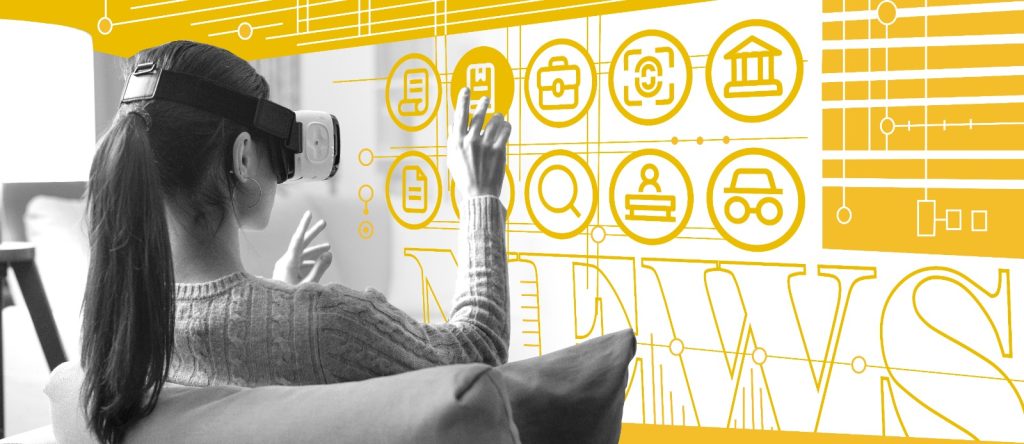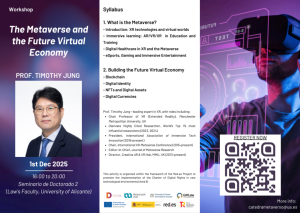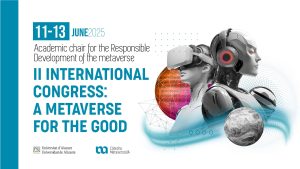
The MetaverseUA Chair Newsletter #5 - January 2024
Greetings, beloved Metaverse enthusiasts!
The MetaverseUA Chair is back in action, and you know what that means… exactly! We’ve ̶a̶s̶k̶e̶d̶ ̶C̶h̶a̶t̶G̶P̶T̶ ̶f̶o̶r̶ crafted with our very own hands a new edition of our globally acclaimed newsletter. This latest issue is set to compile all the noteworthy news in the AI/Metaverse/Immersive Technologies domains we stumbled upon during the Christmas break to help you kick off the year well-informed (our bosses don’t buy into the whole vacation idea, what can you do). So, strap on those virtual reality glasses, and let’s dive in…

Potentially beneficial (?) AI uses
The initial topic we’re delving into revolves around what is unquestionably the most significant news currently—the conflict between Israel and Palestine (which may eventually be recognized as a genocide). In this context, it seems that the UN has enlisted the services of an AI company to untangle the Palestinian crisis. “Untangle”, however, may be too generous a word.
In particular, CulturePulse’s AI model is dedicated to creating an authentic virtual simulation of Israel and the Palestinian territories. However, this simulation or «digital twin» goes beyond mere territorial representation. Its goal is to virtually reproduce every individual within that region, encompassing demographics, religious beliefs, and moral values that closely resemble their real-world counterparts. This holistic approach integrates socio-ecological elements pertinent to the Israeli-Palestinian conflict, offering potential assistance in forecasting future developments or events.
While it’s not the first instance of AI being utilized for peacekeeping purposes, it certainly stands out as one of the most significant applications to date, considering the scale and complexity of the aforementioned crisis.
Attorneys, sharpen your claws!
A lot of intriguing technology-related legal battles are unfolding these days. To kick things off, you might want to take a look at this article detailing how a lawsuit initiated by a trio of artists against Midjourney and Stable Diffusion (both AI image generators) has resulted in the revelation of a comprehensive list containing the names of thousands of photographers and artists curated by Midjourney, for the purposes of imitating their unique styles and allowing users to generate AI pictures with a similar artistic touch. If you’re feeling nosy, the list is out in the open now, and you can take a peek right here.
In the same line, especially noteworthy is the legal action initiated by the New York Times against OpenAI and Microsoft, accused of utilizing data published by the former for the training of ChatGPT and LLaMa. This case, however, presents a distinct feature that could significantly impact the outcome of the litigation compared to other similar actions—specifically, the resemblance of the results generated by these technologies to the original material employed as input. In the ongoing clash between traditional media and emerging technological advancements, this particular lawsuit is positioned to become a pivotal milestone, so we will certainly be attentive to its developments.

Next, in what could be described as a quixotic enterprise, the Spanish Media Association (Asociación de Medios de Información Española, o AMI) just filed a lawsuit against Meta (giants or windmills?), claiming they’ve long been breaking privacy laws in a way that has allowed them to gain an unfair edge in the ad market. Specifically, they’re pointing fingers at Meta’s broad gathering and selling of users’ personal data, which has turned them into a top choice for advertisers looking to tweak their ad campaigns. The compensation this group is gunning for is no joke, hitting a solid 550 million in damages. The Chair’s staying vigilant for what unfolds next, but if in the meantime you want to dive deeper into the issue, feel free to check out this and that.

Regarding META’s questionable data collection practices, let’s also touch upon their recent maneuver in Europe: they’re gearing up to introduce an ad-free option for Facebook and Instagram apps, which, in theory, aligns more closely with EU standards and offers a less intrusive avenue for personalized ads. Nevertheless, some argue that the actual impact of such a model on their data collection tendencies appears to be less severe than initially presumed. Whether this pay-for-privacy approach gains traction (or receives approval from the authorities), well, that’s still up in the air. However, it makes one ponder whether, should this model prove successful, it might eventually broaden its reach into the company’s virtual space, Horizon Worlds.
Through the looking glass
As tech keeps evolving, we witness the continuous refinement of software and hardware, also in the metaverse realm. Take HTC’s latest trackers, for example. They let you capture all your body movements for playback in virtual realms, without the hassle of a full-body suit (which, let’s be honest, sounds kind of annoying). You can attach up to 5 of these trackers on a camera mount or strap them to your wrists and ankles to capture motion. Currently, they seamlessly integrate with SteamVR and OpenXR compatible headsets, although HTC has yet to reveal whether they’ll join forces with the standalone Meta Quest headsets.

And as the prophecy goes, when a new Supreme rises, the old one fades away… As XREAL cements its position as a front-runner in the augmented reality domain, securing 51% of the market through the sales of its glasses, the gradual withdrawal of Windows from this realm is becoming increasingly apparent. Following the earlier announcement of discontinuing its Windows Augmented Reality app in upcoming OS versions, it appears that the future prospects for the HoloLens augmented reality glasses developed by the company are growing dim. Once again, we’ll be sure to keep you in the loop on any potential (non)developments that come our way.

When you play the game of thrones, you win or you die…
Although we’re a bit fashionably late to the scene, we didn’t want to wrap up this newsletter without giving you a quick rundown of the power plays that went down at OpenAI HQ in the last week of November. Essentially, the CEO (Sam Altman) was ousted based on somewhat vague allegations, prompting a significant number of the company’s employees to threaten to defect to Microsoft if the decision wasn’t reversed. Although Altman was eventually reinstated, the potential repercussions of such a removal on the company’s future had the situation not been resolved come to show that the AI industry is, indeed, no playground.

Ctrl+Alt+Goodbye!
And with that, we wrap up today’s edition, folks. We trust the fifth installment of our newsletter kept you engaged. Rest assured, we’re committed to ongoing efforts behind the scenes to deliver the freshest and most exciting updates in the vast realm of the metaverse!
Before saying our goodbyes, a quick reminder: On February 8th, we’re hosting on-site lectures introducing legal issues in the metaverse for beginners. Specifically, the talks will take place between 17:00 – 20:00 at the Conference Room of the University Headquarters in Alicante (C/ San Fernando, 40). Free (!) registration is still open.
And do not forget about the Call for Papers for the I International Congress that we’ll be hosting in June on the responsible development of the Metaverse. If you have any appealing proposals, we strongly encourage you to send them our way (deadline: 28 february).
May your code run smoothly, and your quests be grand.
Últimas noticias y eventos
-
25 Nov 2025 EventosNew Workshop | The Metaverse and the Future Virtual Economy, by Prof. Timothy Jung
-
14 Nov 2025 NoticiasMetaverseUA Chair Newsletter #22 – November 2025
-
24 Oct 2025 NoticiasMetaverseUA Chair Newsletter #21 – October 2025
-
28 Jul 2025 EventosHit play: Recordings from the II International Congress now available!
-
28 Jul 2025 Histórico de actividadesII International Congress: A Metaverse for The Good Part II: EspañaXR - Tecnologías inmersivas, emprendimiento y políticas públicas







